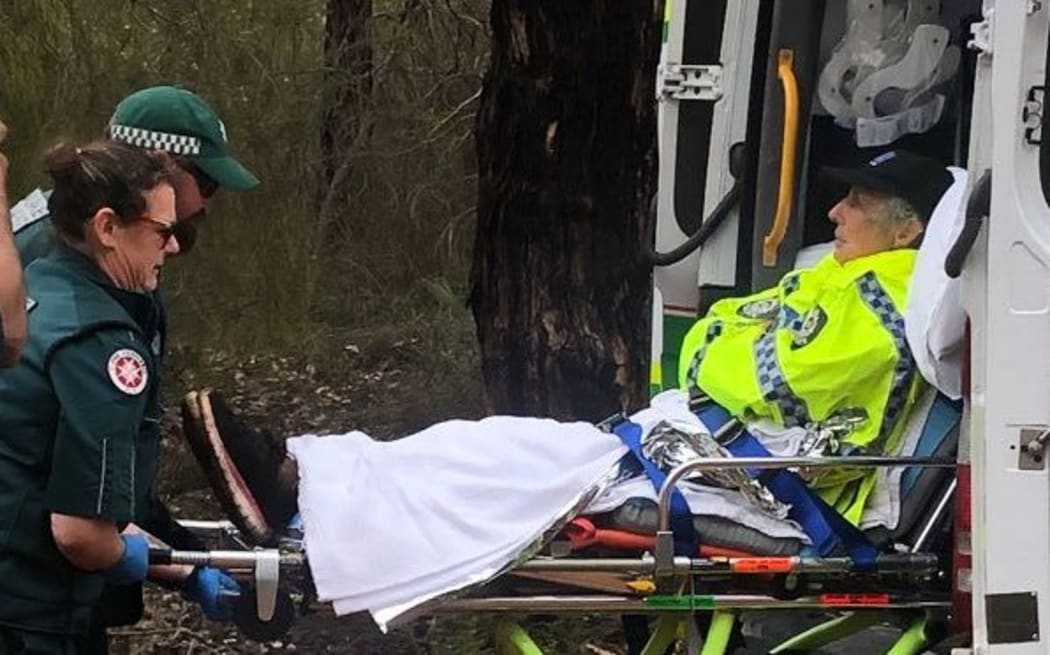An 84-year-old grandmother from Whangamata has been found alive three days after she went missing in remote bush land in WA's Great Southern region.

Patricia Byrne from Whangamata is recovering from her ordeal in hospital. Photo: Twitter / WA Police
A New Zealand family is celebrating what they've called the best-ever Christmas present after an amazing tale of survival in Western Australia's Great Southern Region.
Their mother, grandmother and great-grandmother, Patricia Byrne, was found late yesterday after spending almost four days alone in the bush.
She'd been helping family members maintain walking tracks in the Stirling Range National Park when she went missing.
She had no food or water and temperatures were as high as 39 degrees.
Up to 70 emergency volunteers and police were involved in the search.
Her grandson Blair Coatsworth says the family is relieved. "We are just really excited. When the police officer walked over to us we thought we were getting the worst of the worst. He just hit us with the best Lotto that we could have for Christmas. That's just the best Christmas present ever."
Patricia Byrne's medical condition is still being assessed but police said she had been communicating with her rescuers.
Inspector Geoff Dickson, who led search and rescue efforts, said she was found after three days of searching.
"Two police officers from one of our local police stations were out on an interior road that circles through the national park as part of our containment patrols and they found her stepping out of the bush.
"It was just elation that erupted throughout the whole search effort because after four days there was just that feeling... was she going to make it?"
He said the officers couldn't believe their eyes.
"When they saw her off in the distance they thought who's this? What's that person doing out here in the middle of the bush? When they got a bit closer the clothing matched and there she was. I think initially she said 'boy, I'm glad to see you'," he said.
Mr Dickson said Ms Byrne was from Whangamata, and had been visiting family in the area as she religiously had for the past 20 years.
"She knows the area. It just goes to show, and it's a really great warning to New Zealanders and Australians, that if you're out and about you've got to be really careful. Nature is dangerous thing and it's easy to get disorientated. You're lucky if you can survive a four-day trip in the bush."
He said authorities would meet with her and her family in the coming days to determine how she survived, but it was likely she had found shelter and drank water from puddles.
"She is a little bit jumbled at the moment in terms of her memory of it, she is 84 after all, but there's an inner resiliance there that all of us have questions. She's a strong old chook to be able to hold out for those four days in those varied weather conditions, there's something going on inside her that you and I probably don't have."
The alarm was raised after Ms Byrne disappeared while helping family members maintain walking tracks in the Stirling Range National Park.
She was last seen walking down a fire break on Thursday.
Mr Dickson said inclement weather on one of the nights had been particularly concerning given Ms Byrne's age.
"The weather conditions weren't ideal overnight, we had quite strong winds and rain here on the northern part of the Stirling Ranges," he said.
"Exposure is one of those insidious things, that creeps up on you, and at 84 years old it doesn't matter how fit you are."
This is the moment missing 84yo woman Patricia was located by officers from @TambellupPol this morning. Great job by all searchers, including 40+ State Emergency Service volunteers #perthnews pic.twitter.com/ijxlamzptr
— WA Police Force (@WA_Police) December 16, 2018
Bob Cooper, who runs bush survival courses, said Ms Byrne's survival was "incredible".
"Your will to survive is something you can't lose."
Mr Cooper had not expected Ms Byrne to survive her ordeal. "I thought she wouldn't be alive after this amount of time because you need water, she must have been able to find water or not moved," he said.

